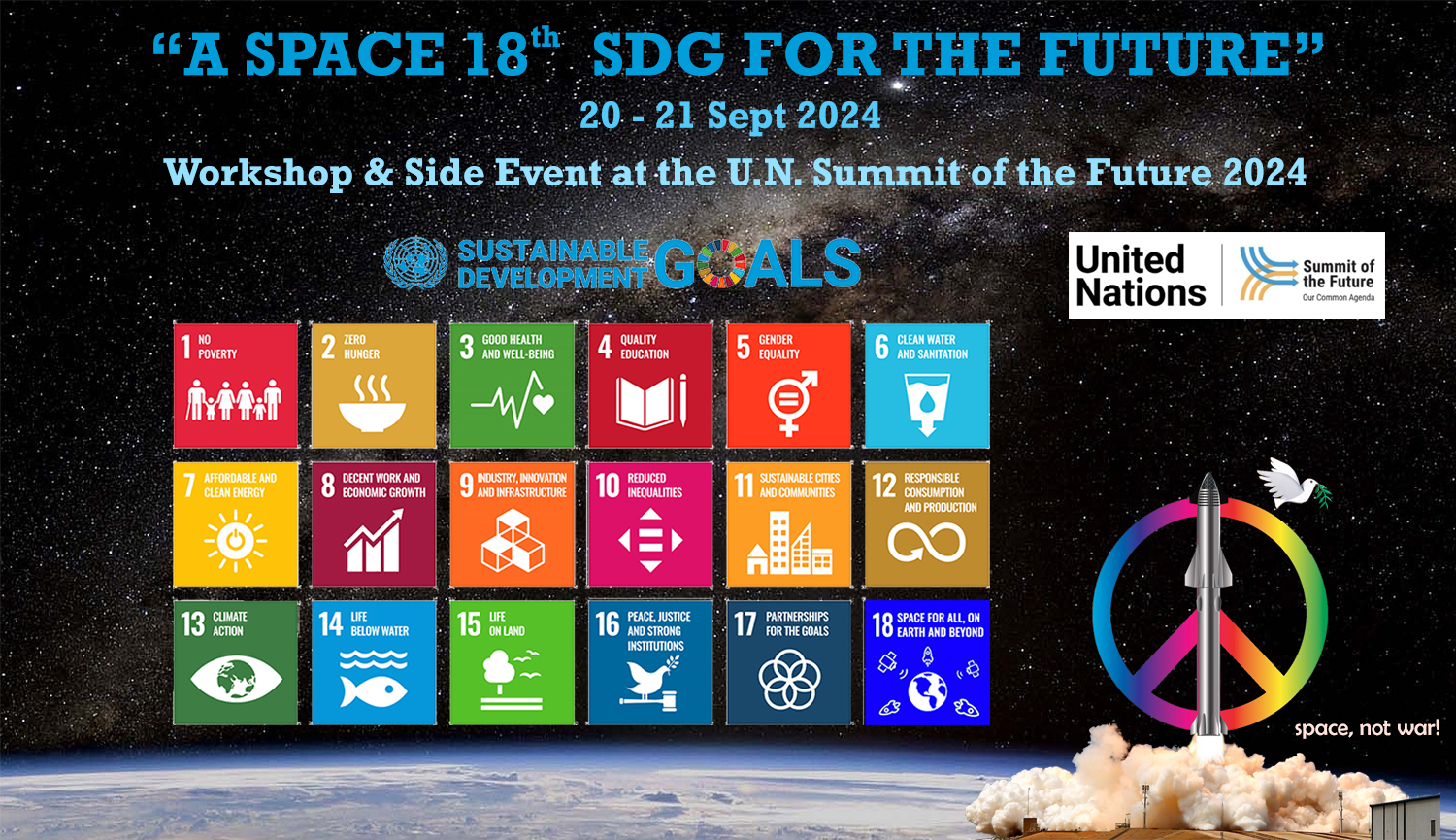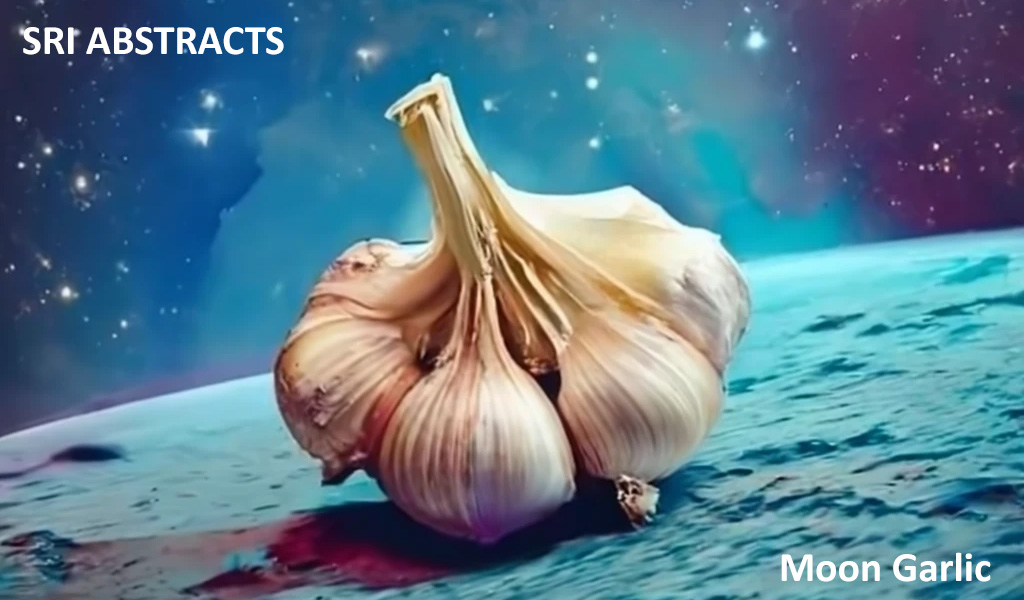Artificial Intelligence does not experience the Overview Effect!
A final recommendation from the A Space 18th SDG for the Future Summit
—— For Immediate Release ——
The Overview Effect, the profound shift in human perception that occurs when one sees Earth from the outside, has the power to foster peace and global brotherhood. This underscores the urgent need for an increasing number of people, not just machines, to venture into space.
The concept encapsulated in the title above is the culmination of a two-day discussion held in New York under the auspices of the Summit of the Future. The Space Renaissance International and its 102 allied organizations, the Space 18th SDG Coalition, played a pivotal role in organizing these two events.
The first event[1] took place at the United Nations Plaza 777, NYC, in the heart of the U.N. Headquarters Plaza, thanks to the generous hosting of Henk Rogers[2]. Approximately 50 participants, both in person and virtually, engaged in a robust discussion on the necessity of amending the U.N. 2030 Agenda for Sustainable Development. The key proposal was the addition of an 18th SDG, with a specific focus on Civilian Space Development. This discussion was furthered during a Side Event[3] at the Consulate General of Jamaica in NYC, organized and hosted by Dr. Claire Nelson[4]. Robert Katz[5] and Adriano V. Autino[6] expertly co-chaired both events.
The passionate discussion—which included addresses by Frank White, Bob Zubrin, Paul Werbos, Rick Tumlinson, Gary Barnhard, and Sian Proctor[7]—allowed us to update our political focus on the Space 18th SDG campaign. We want to forward the following final recommendations to the United Nations 79th General Assembly.
As representatives of the Space 18th SDG Coalition of over 100 Non-Governmental Organizations[8], we declare and affirm that the question of what future we wish to see come to pass must be addressed both individually and in all our communities of interest. Regardless of our distinctions, as humans, we must find ways to engage in this question and articulate what we are willing and able to do to make it so at every level. The Space environment affords humanity a wealth of resources, including energy, materials, and the understanding necessary to build and maintain habitable worlds. We must become the best stewards of our mother planet and life as we know it in its myriad and manifold forms. We must lend our efforts to achieving a realized archology that implements our evolving understanding of the relationships between humans, the cosmic natural environment, and the built environment so that we not only survive but thrive as a species. We must not wait for the future; we must build it!
Our civilization recently passed 8 billion citizens and is facing the biggest global crisis of all time.
Energy demand is growing exponentially worldwide, driven by a growing standard of living and the fielding of new technologies, such as Electric Mobility, Global Communication, Artificial Intelligence, Electronic Money, and related supercomputers. Access to rare earths – increasingly needed to craft electronic components and batteries – is now added as a cause of conflicts on Earth to the more traditional access to oil and other resources. The “Green Transition” was based on the hypothesis that the energy demand would decrease. While the use of renewable sources is growing, the use of fossil fuels is growing too, and all the power sources together are still insufficient to meet the ramping energy demand! For that reason, the Green Transition strategy has proven itself utterly insufficient to the needs of humanity today.
Space can solve the energy problem and the new needs generated by the electronic society in an equitable manner, making it truly available for all: rare elements and many valuable resources can be found on the Moon and Asteroids. And, by progressively moving industrial development into outer space, the energy demand on Earth would be halved in perspective. Big servers can be located in orbit, on the Moon, and at Lagrange points, directly fed by solar power. We assert that the only way to achieve the 17 SDGs is to add an 18th SDG, focused on civilian space development, as the true enabler of sustainable development.
Situational awareness in the cosmos. Several speakers underlined the philosophical concept that the Earth is in space, it has always been in space, and will always be in space, and that we are immersed in a cosmic, not simply a planetary, ecosystem. Philosophical, intellectual, and scientific awareness must be enhanced and duly disseminated to public opinion by proper outreach.
The Overview Effect, as explained by Frank White – one of the leaders of the Space 18th SDG movement – had perhaps the highest number of references during the two days. The need to institutionalize this concept’s value and define it as an educational matter emerged from the discussion. By seeing planet Earth from outside, astronauts saw their perception of the world completely changed: no borders can be seen from outer space, our mother planet appears like a small fragile ball floating in the infinite universe, wars appear genuinely absurd, and spending 2.5 trillion dollars per year for weapons systems targeted to death is seen as a totally insane choice, in comparison to what can be done for life, with even a tiny part of that budget. Experiencing the Overview Effect should be declared to be a Human Right. It is worth noting that the overview effect is not just a creature of intellect, natural or artificial; it is a visceral understanding of our species’ context. However, it has the tremendous power to quickly change human mentality toward a more mature worldview, enabling ethical evolution, new civil brotherhood and sisterhood, and even a new space romanticism.
Being AI machines “intelligent” but not sentient, so far, they cannot experience the Overview Effect. We don’t know if and when AIs will become sentient. For sure, humanity cannot wait for that moment, which could eventually result in the achievement of a strong partnership between AIs and humans (noted Frank White), before start expanding into space. Humanity dramatically needs the benefit of the overview effect, to boost ethical evolution today. Therefore, we urgently need an increasing number of humans to start traveling and living in space.
Inclusivity and democratizing access to space. We must ensure that developing countries will not only benefit from space development, e.g., the incoming cis-lunar economy but that all peoples of planet Earth will have equal top opportunities and engage as they can at any level. We must help brilliant minds build space capacities wherever they are since no borders or ethnic/social differences are visible from orbit or beyond.
Space for peace and social and economic growth. Civilian Space Development will make resource wars obsolete, thanks to the great abundance of resources in the solar system. The space tradition, from Soyuz-Apollo to MIR to the ISS, brings forward a history of collaboration and friendship among space explorers of different countries, even when their nations are in conflict on Earth.
Civilian Space Development will trigger a new industrial renaissance, generating millions of new jobs and business opportunities on Earth and in outer space. This will include economic growth, technological innovation, social equity, and cultural/ethical evolution. Space 4 All means equal opportunity for all countries, whatever their social and economic conditions.
Space for Earth’s Environment. By expanding civilization into outer space, the Earth’s environment will be relieved, in perspective, from the burden of industrial development on its carrying capacity. A space circular economy ecosystem, technologies, and methodologies developed by space communities will be useful on Earth, supporting zero waste, oxygen, water cycle, 100% recycling, and advanced agriculture.
Space for Earth’s Youths. Kicking off civilian space development before 2030 will give younger generations a new perspective, giving them big projects worth their engagement, commitment, and brain power. Expansion of civilization off-world offers a grand new deal of inspiration and hope for the future, the awareness that a positive future still exists and might well be a “Golden Age.”
The Space 2030 Agenda. The U.N. Space 2030 Agenda should be amended, adding a fifth Overarching Objective, focused on civilian space development and creating space communities, as a shared goal that must be realized. We must identify and catalyze the confluence of interests between nation-states and their respective space agencies, commercial enterprises, and Non-Governmental Organizations, embodying them in outcome-driven projects. The Space 2030 Agenda shall become the strategic document to instruct the necessary milestones to be achieved during the 2025-2030 five-year period, instilled with the ethos that a combination of cooperation, collaboration, and competition best serves success. We must seek to architect, engineer, and implement anthropologically sound space infrastructure as a realized archology for settlement purposes and to become the best stewards of our planet Earth and life as we know it. Among the most relevant and urgent themes are the recovery and reuse of orbital debris, propellant production from extraterrestrial materials, simulated gravity, and the protection of human life in space.
Join the Space 18th SDG Coalition!
Want to discuss this article? You can do it on the Space Renaissance Open Forum.
[1] See the day-long recorded video: https://youtu.be/rFyAqmb4yhs
[2] Henk Rogers – International Moonbase Alliance, one of the Space 18th SDG Coalition partners – hosted the event
[3] Here’s the recorded video of the 75 minutes forum: https://youtu.be/vqDpn6v7S-A
[4] Dr. Claire Nelson, The Futures Forum, one of the Space 18th SDG Coalition partners
[5] Robert Katz, CEO and Founder of the World Innovation Network
[6] Adriano V. Autino, CEO and Founder of Space Renaissance International, founder and coordinator of the Space 18th SDG Coalition.
[7] Sian Proctor is the first African-American woman commercial Astronaut. Proctor went to space as a commercial astronaut and pilot of the Crew Dragon orbital spaceflight mission Inspiration4, which launched on 15 September 2021.
[8] https://spacerenaissance.space/the-space18sdg-proposer-organizations/
Download a pdf version of this release.









 Space Renaissance France (French Chapter of SRI)
Space Renaissance France (French Chapter of SRI)  Space Renaissance USA, Inc. (USA Chapter of SRI)
Space Renaissance USA, Inc. (USA Chapter of SRI) Space Renaissance (Italian Chapter of SRI)
Space Renaissance (Italian Chapter of SRI) Space Renaissance Academy
Space Renaissance Academy Space Renaissance Initiative Group
Space Renaissance Initiative Group